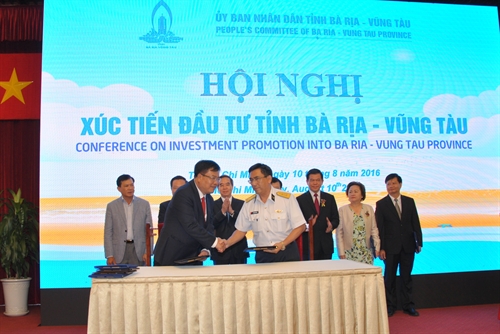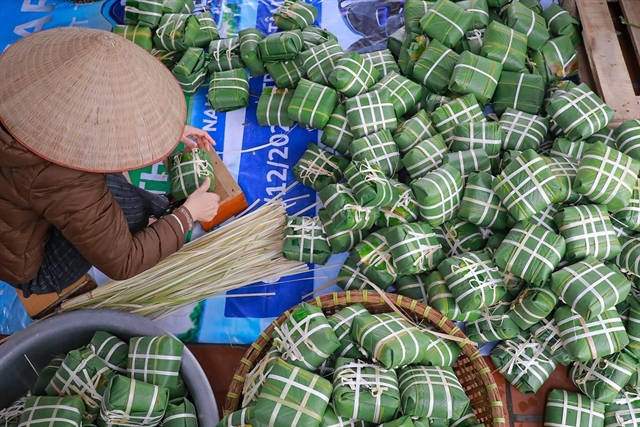 Economy
Economy

To promote its advantages and potential efficiently, Bà Rịa-Vũng Tàu Province will focus on developing five key economic sectors in 2016-20 period, its Party chief has said.
 |
| Companies sign memorandums of understanding with the province to invest a combined VNĐ38-VNĐ45 trillion ($1.7 billion - $2.01 billion) in the province. — VNS Photo Xuân Hương |
HCM CITY — To promote its advantages and potential efficiently, Bà Rịa-Vũng Tàu Province will focus on developing five key economic sectors in 2016-20 period, its Party chief has said.
Speaking at a conference in HCM City yesterday to solicit investment in the province, Nguyễn Hồng Lĩnh, Secretary of the Party Committee, listed them as industrial production, ports, logistics services, tourism, and high-tech agriculture.
The province hopes to attract experienced and qualified investors who can contribute to making it more vibrant and prosperous, he said.
It would prioritise attracting large projects that use modern and eco-friendly technologies, make value-added products, consume less energy and be competitive and environment-friendly, he said.
Nguyễn Thành Long, deputy chairman of the Province People’s Committee, tabled a list of projects in which Bà Rịa-Vũng Tàu is seeking investment, including a US$10 billion oil refinery in Long Sơn – Vũng Tàu city, the VNĐ2.5 trillion Cái Mép Hạ Logistics Centre, VNĐ20 trillion Biên Hòa-Vũng Tàu rail route, the cruise terminal and Sao Mai-Bến Đình tourism services complex, Núi Dinh Tourism Park, Long Hương Eco-urban Area, a high-tech agricultural area in Xuyên Mộc District, and the Bà Rịa-Vũng Tàu Fisheries Centre.
Lĩnh said “The province would continue to adopt measures to create an investor-friendly investment climate”.
Located in the Southern Key Economic Zone, the province has advantages like a deep-sea port, which plays a key role in international container transhipment, an industrial base and good transport infrastructure, he said.
For the past 25 years its economy had been growing steadily and continues to move in the right direction, and this development strategy would lay a strong foundation to achieve a breakthrough, he said.
So far Bà Rịa-Vũng Tàu has attracted 297 foreign investment projects worth $27 billion and 442 others by Vietnamese companies with a registered capital of over VNĐ240 trillion ($10.76 billion).
Speaking at the conference, Deputy Prime Minister Trịnh Đình Dũng hailed the province’s achievements over the years, pointing out that while accounting for just 0.6 per cent of the country’s area and over 1 per cent of the population, Bà Rịa-Vũng Tàu contributes nearly 8 per cent of the country’s GDP and 12 per cent of the Government’s revenues.
But the competitiveness of many of its products remain low and transport infrastructure linking economic zones and industrial parks with ports is modest, and these should be addressed, according to the deputy prime minister.
He urged the province to speed up administrative reform, and adopt policies to attract quality human resources from elsewhere, especially HCM City.
Business executives attending the conference wanted the province to provide them more support with land acquisition and compensation and petitioned the Government to review land lease policies.
The province should pay more attention to developing amusement places to attract tourists staying long in the province, they added.
Many investors with plenty of expertise and deep pockets expressed interest in investing in the province.
Nguyễn Thiện Tuấn, chairman of the DIC Corp, said the company invested more than VNĐ10 trillion in the province and would invest another VNĐ16 trillion in urban development, tourism-related property, hotels, entertainment centres, golf courses and logistics in 2016-20.
Gary Martin, head of development at Ho Tram Strip, the largest foreign-invested tourism project in Việt Nam, said: “We have invested $750 million here. We have earmarked an additional $300 million for construction projects which are either already in progress or due to start very shortly.”
Four companies, Nguyễn Hoàng Investment and Development Joint Stock Company, DIC Corp, Sài Gòn New Port Corporation and BRG Group, signed memorandums of understanding with the province to invest a combined VNĐ38-VNĐ45 trillion in the province. — VNS




